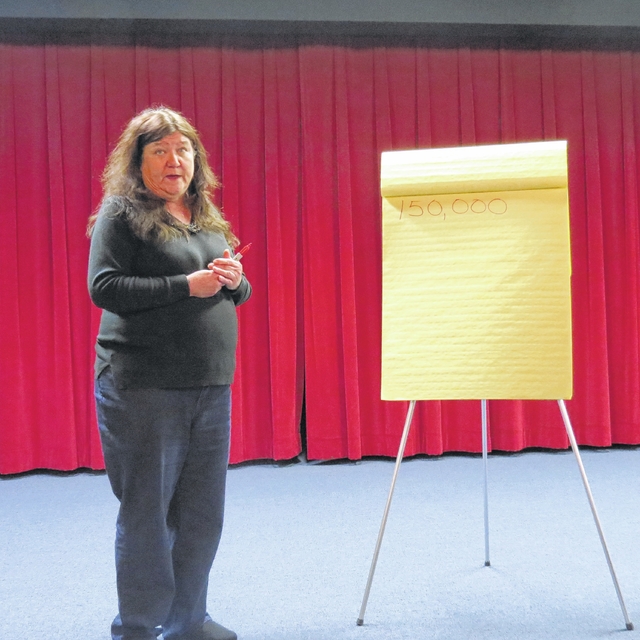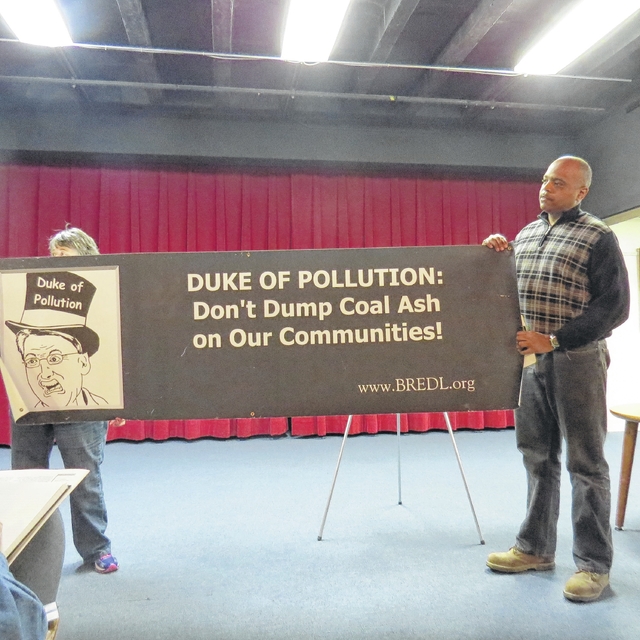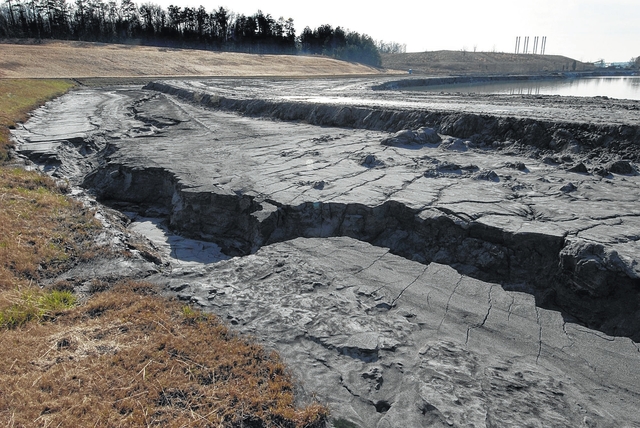A small but passionate group of residents gathered last week to formulate a plan to keep coal ash out of Anson County.
Pee Dee Water, Air, Land and Lives met at the Hampton B. Allen Library on Thursday with a representative from the Blue Ridge Environmental Defense League to ask residents to lobby their county commissioners in an effort to prevent Waste Connections from accepting coal ash from Duke Energy.
In January 2015, the environmental league said information on Anson County’s potential use as a coal ash disposal site was gleaned from Duke Energy’s Riverbend and Sutton power plant coal ash excavation plans.
According to the L.V. Sutton Electric Plant Coal Ash Excavation Plan available on Duke Energy’s website, Anson could indeed see coal ash in its future.
The plan, last updated on Nov. 13, 2015, says that the Colon Structural Fill is in Sanford, and that ash will be used as fill material for a reclaimed mine.
“In the event the structural fill options are not available, the Anson County Landfill, located in Polkton, N.C., has been identified as the alternate location,” the plan states.
The plan was discovered by Therese Vick, the coal ash coordinator with the league. Although she works in Raleigh, she traveled to speak to the Anson group for the meeting.
Denise Lee, a Pee Dee WALL member, and Cary Rodgers, a league member, are both from Anson County. Both warned of the dangers of allowing coal ash into the landfill.
Duke’s plan explains that the coal ash would be transported by railway, with trucks as a backup plan.
Lee said using the railway runs the risk of spreading air pollution throughout the county. A crash involving a truck or train carrying the coal ash could worsen the problem, she said.
Duke says the ash presents little risk to the public. Its Web page for ash management has fact sheets on the topic.
“The U.S. Environmental Protection Agency has evaluated coal ash extensively and has repeatedly determined that it is not a hazardous waste, most recently in December 2014,” Duke Energy says on its website. “Even if you come into contact with ash, studies show you have to ingest large amounts to potentially experience adverse effects.”
Environmentalists at the library meeting disagreed, saying that coal ash is made up of fine particles that can easily be ingested and cause health problems.
Duke has come under fire for its coal ash before after there was an ash spill in the Dan River in February 2014. The deal cost Duke $3 million in cleanup fees alone, according to the EPA.
In that case, the EPA acknowledged the presence of pollutants but said they did not exceed safety limits.
“The coal ash that was released into the Dan River contains unburned carbon and various metals including arsenic, cadmium, chromium, copper, lead, mercury, nickel, selenium and zinc,” the EPA said on its website. “There have been no exceedances in human health screening in the surface water and sediment samples collected from the Kerr Reservoir for the contaminants of concern. Some coal ash will be left in place because of the risk of re-suspending previous polychlorinated biphenyl (PCB) and mercury contamination.”
Rodgers said he worries about coal ash in Anson County affecting the Pee Dee River through leachates.
The coal ash is typically stored in holding pools with a thin liner that could leak, he said. Those pools could also overflow, and either scenario could send chemicals from the coal ash into the county’s water, he said.
Vick said the pool liners are barely thicker than two credit cards. She also said the landfill would likely use the Anson County Wastewater Treatment Plant to treat leachate, but was concerned that the waste would not be properly treated before making it back into the county water supply, saying that most regular wastewater plants are not prepared to handle heavy metals.
Rodgers said he doesn’t want to see Anson County become a Flint, Michigan. Flint is currently facing a serious water pollution problem where residents’ water has contained elevated lead levels that can cause a host of detrimental health effects.
“What if they try to treat it and can’t and put it back in our water and we drink it?” Rodgers said. “To me, the biggest issue is with messing up our water.”
Vick also said coal ash could potentially be stored in clay mines in Anson County as it has in other areas in the state, and advised residents to watch for mine sales.
Lee was also concerned that with the amount of coal ash the landfill could potentially bring in, residents may end up with less room for their own garbage. Rodgers added that decreased property values may be another concern, while Lee said the county’s fledgling tourism efforts may be stifled if the area is designated a dumping ground for coal ash.
County Commissioner Bobby Sikes attended the meeting and said he is opposed to letting the landfill accept coal ash. When asked by meeting leaders, he provided the numbers for county clerk Bonnie Huntley and county manager Megan Garner so residents could voice their concerns and get on the agenda for the March meeting.
“This is your community,” Vick said. “You have the right to say no. Your county commissioners have the right to say no. Your local government has to protect you.”
Although only about 20 people attended the meeting, Lee assigned them some homework. She asked all present to spread the word to other residents and to sign a petition against allowing the coal ash. She also asked for county residents to speak at the commissioners meeting at 6 p.m. March 1.
While residents do not have to schedule their remarks and can speak extemporaneously during a time reserved for public comments, Lee encouraged those who want to speak to get on the board’s agenda so that they would have more time. To get on the agenda, speakers must contact the county clerk at least one week prior to the meeting. Huntley can be reached at 704-994-3201.
Reach reporter Imari Scarbrough at 704-994-5471 and follow her on Twitter @ImariScarbrough.

Therese Vick, an environmentalist who works in Raleigh, spoke to a group of concerned Anson County citizens about the potential effects of allowing Duke Energy to send coal ash to the county landfill in Polkton.

Meeting organizers Denise Lee and Cary Rodgers displayed a banner during the meeting showing a caricature of Gov. Pat McCrory with the words, "Duke of Pollution: Don’t Dump Coal Ash on Our Communities!" They criticized the governor for not acting on citizen concerns about the hazardous effects they believe coal ash brings to communities.


